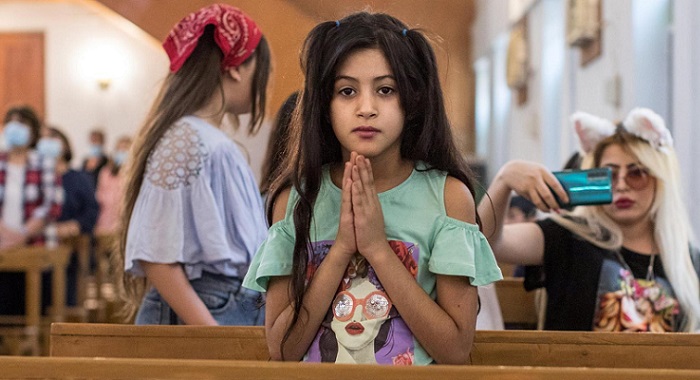The Last City of the Christians
1.5 million Christians once lived in Iraq. The country was home to one of the largest church communities in the Middle East. Today that community has shrunk to a tenth. WELT visited Catholics in Basra, southern Iraq. The charm of the city, which used to be called the "Venice of the East", is hardly felt today.
This article was originally published in German by Die Welt on December 24, 2021. The original can be found here.
By Alfred Hackensberger correspondent for WELT
Pastor Emad is in a hurry. Mass is about to start, but he is not dressed yet. A big party awaits him after mass as the congregation is celebrating the jubilee’s thirty-fifth anniversary as a priest in Basra, Iraq’s third largest city in the south on the Shatt al-Arab River. In the front yard of the Chaldean Catholic Church of St. Theresa, the chairs and tables are already set for the party. Shiny green, red and blue garlands flash on a set cross. Lemonade and a large, overly sweet chocolate cake await the jubilee.

Abuna (Father) Emad, nervously looks at the clock and takes a quick glance at the altar. He wears a large gold cross around his neck on a long chain that dangles over his big belly. “I don’t have much time,” he says, but the 61-year-old starts talking anyway. “We go back to the second century AD and are one of the oldest Christian communities.”
“St. Thomas founded our church on his way from Turkey to India,” he says. “In the fourth century it was a diocese, the first of its kind,” he proudly adds. But you can see from the priest’s face that this long and impressive history alone does not make him happy. The exodus of Iraqi Christians from their homeland troubles him.
The Christian population has been emigrating since the 2003 American invasion, which overthrew dictator Saddam Hussein. Of the original 1.5 million believers, it is estimated that only between 120,000 and 150,000 are left today. They left for the US, Europe, Canada and Australia. A tendency that can also be observed in neighboring Syria – also a heartland for Christians in the Middle East. The turmoil caused by civil wars and terrorist attacks by radical Islamist groups drove them away from their traditional homeland.
Also Read: Those at the Top of the Death List
An additional factor is the steadily deteriorating economic situation in the region, which causes more and more unemployment and poverty. “In the 1970s there were over 4,000 Christian families in Basra. Today there are only 200,” says Father Emad sadly. Five of the 14 churches are still open. “My heart bleeds when I think about it,” says the priest, scratching his gray goatee for a moment. “But here in Basra it is no different than in the rest of Iraq.”
The city on the Shatt al-Arab was spared the terror of Islamic State. During their advance in 2014, the Islamist extremists conquered Yazidi and Christian territories in northern Iraq. But Islamic State did not advance into Basra in the south of the country, 500 kilometers away.
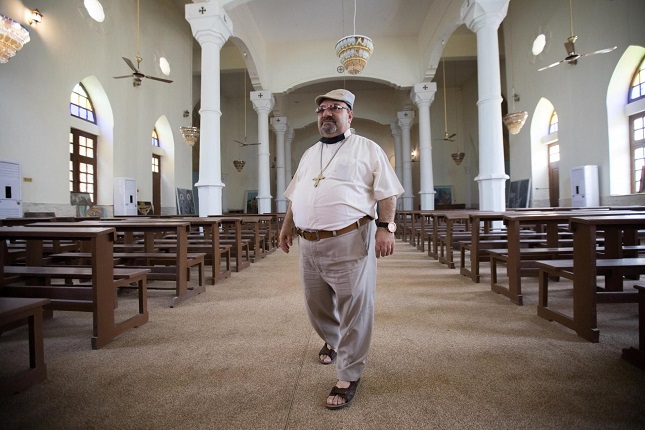
Father Emad is in a much better mood when it comes to Christmas. A cheerful glow can be seen behind the glasses in his dark eyes. “The most important thing is the liturgy on these great days, the rituals and prayers,” he emphasizes. “Spirituality renews the faith and the soul.” It is a feast of mercy, where love and happiness are brought to the hearts of those in need with support and gifts.
“A feast for the ones who are normally forgotten,” he notes. Of course, there is a Christmas market and a Saint Nicholas celebration, but they only play a minor role for the clergyman compared to the actual religious day. They are an important social component, but what counts most is the spiritual element of the birth of Christ. Abuna Emad then hurries away and moments later he is already standing on the altar in priestly robes and reading mass. Not many faithful have taken a seat on the long wooden benches. Only about a third of the church is occupied. It is mainly the elderly who today seek consolation from God.
The mainly Shia trading city of Basra is located 100 kilometers from the Persian Gulf – close to the border with the Emirate of Kuwait and the Islamic Republic of Iran. The region is rich in date palms. Rice, maize and wheat are grown, all of which get their water from the Tigris and Euphrates rivers. However, the main industry is fossil fuels.
From the “Venice of the East” to stinking sewers
Basra has the largest oil and gas fields in Iraq. The cosmopolitan charm of the city, once known as the “Venice of the East” for its numerous canals, is hardly felt today. The few remaining houses of the past are in a shabby and dilapidated state. The canals are disgusting, smelly sewers with loads of garbage floating around in them. In 2018 there were protests in Basra against the pollution of drinking water. Thousands of residents had to be treated in hospital at the time. The protests were soon directed against the “corrupt elite” and quickly spread to other cities in Iraq. Dozens of people were killed in the protests, 15 in Basra alone.
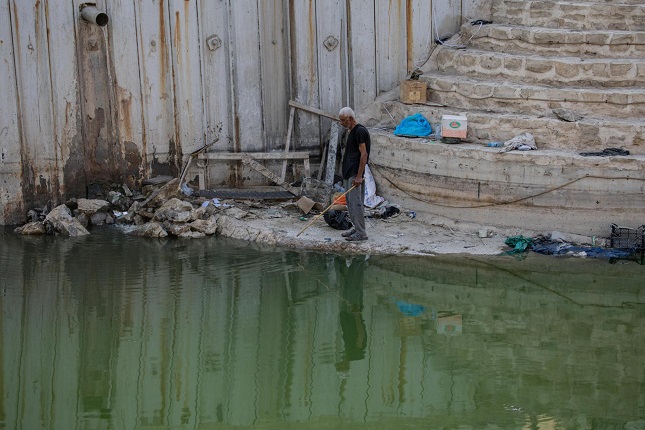
The activists for democracy in the oil metropolis held pro-Iranian Shiite militias responsible for the murders. It is the militias who control the administration, the security apparatus and the economic activities in the city. For religious reasons alone, Shiite Iran has an outstanding powerbase in Iraq. But it is particularly big in Basra, due to its geographical location. The Iranian border is less than 30 kilometers away. Furthermore, ninety percent of the population are Shiites. It was completely different under Saddam Hussein. The dictator had installed a regime in which the Sunnis minority had the complete say. This balance of power changed suddenly with the American invasion in 2003.
“It was then that the Shiites began to put pressure on us Christians. We were told to stop selling alcohol and we women should wear the hijab.” Nassira Raffu remembers that time very well. “The security situation got worse and worse, there were kidnappings and car bombs by al-Qaeda,” says the 55-year-old woman, who lives with her husband in a house next to the church administration in Basra.

It was not until 2016 that the situation improved again, she says. But then it was already too late. “Above all, the young generation has emigrated to the US, Germany and Australia,” she says. “You can’t blame them,” she shrugs. Everyone will look for a better life if they no longer see a future in their homeland. She begins to list the reasons: “There are no jobs, no state support, no social security, no prospects – who would not lose hope and leave for a better place?”
Nassira Raffu has also thought of emigrating with her family. “But every time I’m away from home, I get terribly homesick after a few days.” And then there are her three children. “The youngest is only 18 years old and still has to complete an education.” Next to her, the water splashes over the cascades of a somewhat kitschy miniature fountain that her husband made. On top of a rock, St. Mary is enthroned in the familiar pose: head tilted submissively slightly to the right, in a floor-length white dress with a light blue cloak and outstretched hands.
“Of course, life is difficult in Iraq,” says Hussan Goro in front of St. Theresa’s Church, while Father Emad still leads mass inside. At 32 years old, Goro is a representative of the younger generation. He is a teacher in Basra and volunteers in the Church’s media office. “Sometimes I want to run away, sometimes I don’t,” admits Goro openly. His uncle, a university graduate in Baghdad, was abducted in 2005. Despite paying the $ 15,000 ransom to the kidnappers, they killed him. “As a result, his family emigrated to Australia,” says the young man.
“I want to help shape our Iraq”
Other relatives of his who had to flee from Islamic State in northern Iraq now live in Stuttgart. Like all Christians in Iraq, Goro has many reasons to emigrate. “But I want to help shape our Iraq and not give up,” he says. This is not easy, however, considering the denominational tensions between Shiites and Sunnis, the rampant corruption and dominant paternalism. “As Christians we always have to keep hope,” he replies, almost pugnacious. But the thoughtfulness comes back immediately as he talks about the future and a possible marriage. “It is difficult today because most of the young people are gone. There aren’t enough girls.”
The Church of the Blessed Virgin Mary in Basra’s old town is an imposing building. Italian architects designed the church in Gothic style in 1907 and completed it in 1930. For decades it served as the bishop’s residence. In the 1980s, during the Gulf War between Iraq and Iran, it was a refuge for thousands of refugees. In 2005 the church was closed and fell in neglect. It has been open again for two years after it was restored with financial support from the Iraqi Central Bank.
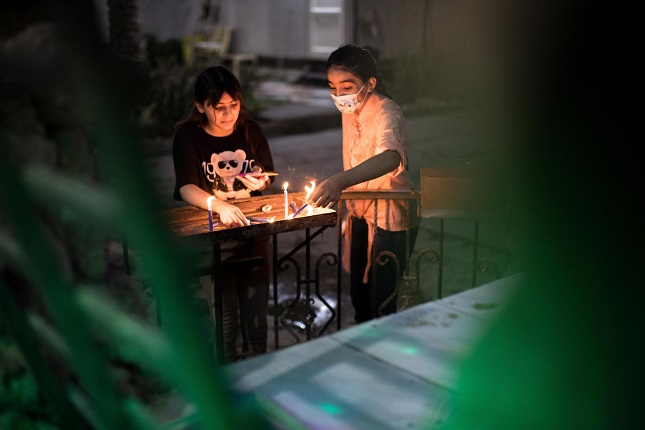
“Everything was broken, and the roof was in danger of collapsing,” says Father Emad as he opens the heavy gate. It is a light, rather unpretentious church building with large stained-glass windows, white columns, crystal chandeliers and statues of saints on the walls. “Here we celebrate the great feasts and, of course, Christmas,” says the Chaldean priest. “It’s also very busy on those days.”
The House of Divine Mercy is located in the backyard of the church. It is a contact point for the needy and a home for the elderly from the community who no longer have family in Basra. One of them is Sabiha Toma, who walks slowly along the sidewalk with a walker. She has lived in the House of Mercy for four years, although she has relatives in Germany and Australia. But Toma, who does not want to give her age, does not want to leave Basra. “I love this city. I have everything I want here,” says the slim woman with a black ribbon in her hair and a satisfied smile.
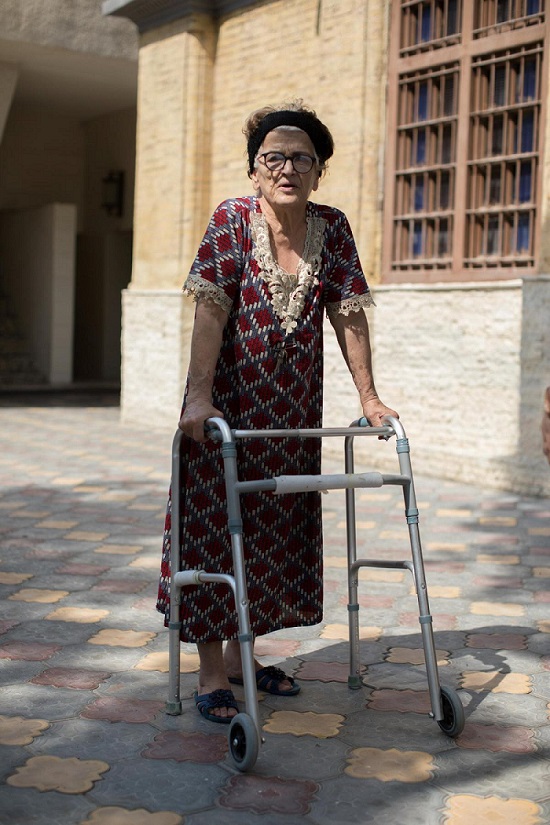
Then she starts to rave about “her Basra”. “We used to be able to swim in the canals and smear ourselves with clay,” she says. “Everyone wore bikinis, short skirts and loose hair on the street.”
“Yes, it was a different world then, free and open, especially for women,” confirms Father Emad. “At picnics in the parks, people drank alcohol and danced, and played cards and bingo in the six social clubs.” Christian or Muslim, there was no difference then. “Everyone was one family”. The priest pauses for a moment. “Those are bygone days that cannot be compared to today,” he says with a thoughtful expression, shaking his head.
Alfred Hackensberger is correspondent for WELT. You can follow him via Twitter @hackensberger and on his blog.
From the same author:
The Return of Terror: Osama Bin Laden’s Heirs
Iranian influence: Iraq’s bulwark against the Martyr-Myth
The man who frees enslaved Yezidi women from the clutches of IS
Iraq now belongs to Tehran’s henchmen – with fatal consequences
Iraq is threatened with the exodus of all Christians
When Kurds fight each other, Erdogan rubs his hands
The Crazy Monopoly Game between Erdogan and Putin
Those at the Top of the Death List
The Islamists and their Drug Problem
Northern Syria: where Erdogan’s mercenary army encounters only 900 US soldiers

